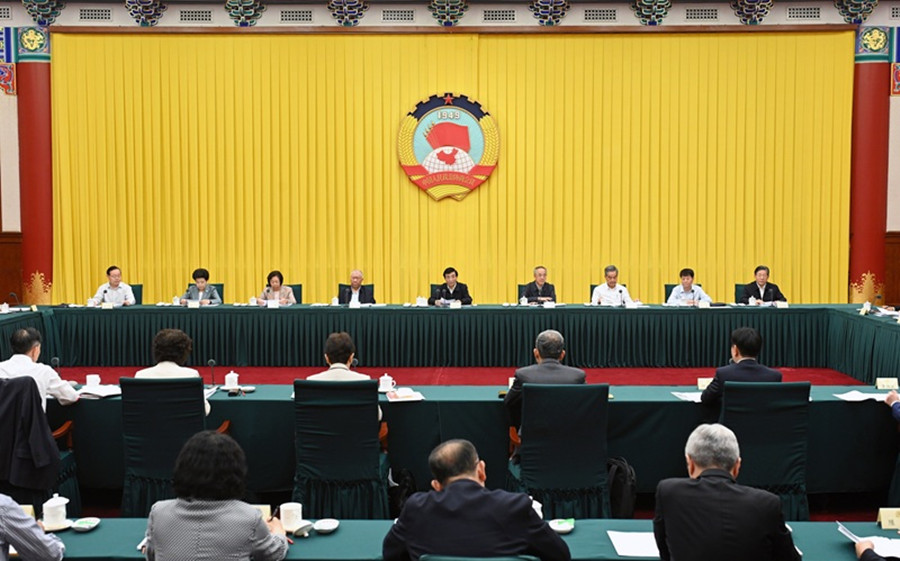CPPCC members discuss regulatory alignment in Greater Bay Area

Wang Huning, a member of the Standing Committee of the Political Bureau of the Communist Party of China Central Committee and chairman of the Chinese People's Political Consultative Conference (CPPCC) National Committee, presides over the 32nd biweekly consultation session of the 14th CPPCC National Committee in Beijing on June 13, 2025. [Photo by Jiang Guidong/CPPCC Daily]
The 14th National Committee of the Chinese People's Political Consultative Conference (CPPCC) held its 32nd biweekly consultation session in Beijing on June 13, focusing on enhancing alignment of regulations and mechanisms in the Guangdong-Hong Kong-Macao Greater Bay Area (GBA).
Wang Huning, a member of the Standing Committee of the Political Bureau of the Communist Party of China (CPC) Central Committee and chairman of the CPPCC National Committee, presided over the session.
Wang said the development of the GBA is essential to the long-term prosperity and stability of Hong Kong and Macao. Since the 18th CPC National Congress in 2012, the GBA development has achieved remarkable progress, demonstrating the strengths and vitality of the "one country, two systems" policy, Wang noted. He called on CPPCC members to thoroughly study and implement the decisions and plans of the CPC Central Committee, and to contribute wisdom and strength to the high-quality development of the GBA.
Noting that the GBA holds strategic significance in the national development landscape, Wang urged CPPCC members to conduct in-depth research and offer targeted and practical suggestions focusing on key issues in promoting regulatory alignment in the region, planning for the development of the GBA during the 15th Five-Year Plan period (2026-30), coordinating scientific and technological innovation, advancing high-level market connectivity, and improving mechanisms to support the region's high-standard opening-up.
He also stressed the need to make suggestions on addressing challenges in business environment optimization, cross-border flow of production factors, and the facilitation of personnel exchanges based on inspections, surveys, solicitation of public opinions, and proposal submissions.
Wang urged greater efforts to promote the GBA's achievements, opportunities, and bright prospects, and to share compelling stories of China's reform and opening-up in order to attract more investment of capital, technology, and talent, and encourage more youth from Hong Kong and Macao to study, work and live on the Chinese mainland, thereby enhancing the integration of Hong Kong and Macao into the overall national development agenda.
Ten members of the CPPCC National Committee shared their insights. They emphasized the need to establish and improve mechanisms for regional cooperation and coordination, align development strategies, and facilitate collaboration on major projects. They called for the enhancement of high-level connectivity, better utilization of major cooperation platforms, and advancement of market integration in the GBA to ensure the efficient and convenient flow of various factors. They also advocated for further people-to-people exchanges and stronger emotional bonds among GBA residents to foster comprehensive and in-depth cooperation and achieve shared development across the region.
CPPCC National Committee vice-chairpersons Hu Chunhua, Ho Hau Wah, Leung Chun-ying, Su Hui, Mu Hong, Xian Hui, Wang Dongfeng, and Jiang Zuojun attended the session. Senior officials from the Hong Kong and Macao Work Office of the CPC Central Committee, the National Development and Reform Commission, and the Ministry of Commerce provided briefings.
Copyright © The National Committee of the Chinese People's Political Consultative Conference.
All rights reserved. Presented by China Daily.
京ICP备08100501号-1

